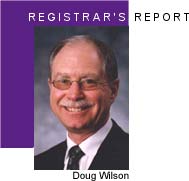


|
Unheralded associate teachers build bridges to teaching success Associate teachers review, analyze and diagnose the work of pre-service teachers. In doing so, they must reflect on their own practice and learn to articulate what they do and why. Associate teachers demonstrate the art of teaching by intent rather than instinct. It's one of the richest experiences available to veteran teachers. |
|
By Doug Wilson Thinking back, two things made me a better teacher. One was writing textbooks, having to understand what would capture student interest and then delivering the goods. The other was serving as an associate teacher. To be a really good teacher, you have to see things from the student's perspective. You must be able to engage them in their own learning, help them to see how what you are teaching is relevant. If you start your lessons with high interest, you can pique their curiousity, command their attention, inspire their involvement. You must also present information in a way that's sensitive to them and oriented to their learning styles. When I had teacher candidates in my classroom, I was able to watch what the teacher was doing and how my students responded. I became a more reflective practitioner. I became more sensitive to the kid who raised his hand to answer a question only to be told "No" by a teacher who marched right on to another student in search of the right answer. What did
that student think? Would he raise his hand the next time? How might we
do it differently? No guidelines The best candidates told me the first day what they wanted to work on. They might want to try a new technique in classroom management. They would use a question and answer format to see how information would flow out of a lesson. They were constantly involving students. Others would just march on through the material without stopping to check whether the students understood. I watched from the back, disciplining kids with looks as need be, making notes, which I'd give to the candidate at the end of the class. Then we'd discuss them later to see what they might have done differently. A fine balance It was a lot of work and responsibility. It was wonderful and intense. It was wonderful because it was intense. We were focused. We were disciplined. But, I took care to make my classroom a safe space for them, where they could be challenged to experiment. I encouraged them to find their own style and not mimic mine. Being a guide, a confidante, a mentor, a colleague and a support while also acting as an assessor is a fine balance. As an associate, you must be objective and supportive. Both you and the candidate know that at the end of the practicum, you will write the report and provide the assessment. Now, across the province, it is increasingly difficult to find people to fill roles as associate teachers. It remains a role that requires experience, leadership capabilities, sensitivity, strong communication skills and current knowledge of faculty programs and courses. It's a critical part of professional development. It's a significant but undervalued role in the teacher education process. And it's a volunteer position. Good teachers are made. Associate teachers have a major impact on the successful start teacher candidates have in teaching. They do it without guidelines. It's a demanding role, but one of the most rewarding you can take on. Only the best teachers - those who are committed to giving their time and providing support - should be associate teachers. The best usually are. |
|
From the Chair | Registrar's Report | Remarkable Teachers | Blue Pages News | Reviews | Calendar | Netwatch | FAQ | Letters to the Editor Ontario College of Teachers 121 Bloor Street East, 6th Floor Toronto ON M4W 3M5 Phone: 416-961-8800 Toll-free: 1-888-534-2222 Fax: 416-961-8822 http://www.oct.ca info@oct.ca |